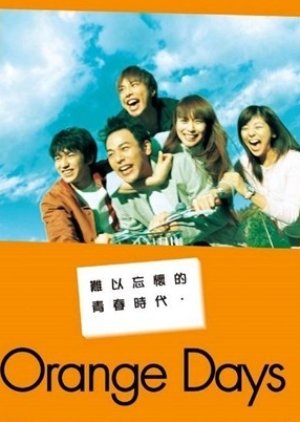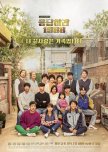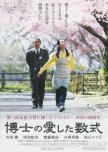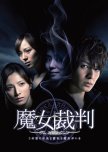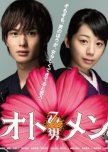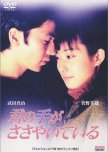
also has a death female lead. It is a friendship, romance, youth drama and focuses on a university student, who meets and falls in love with a death violinist, who is frustrated with her life. He helps her accept her disabilities and push her to chase her dreams.
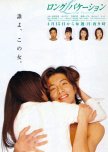
Both have a remarkable cast,, acting, storyline, romance, and witty dialogue. Both are "feel good"dramas that you will want to watch again and again! Wish the new ones were as good!
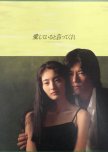
*Aishiteiru to Ittekure* (1995) and *Orange Days* (2004) feel remarkably similar in both theme and emotional tone. At the heart of each story is a deep exploration of communication beyond words. In *Aishiteiru to Ittekure*, Hiroko falls in love with Koji, a deaf artist, while *Orange Days* follows Kai, a college student, as he connects with Sae, a violinist who lost her hearing. Both dramas focus on how love and understanding can flourish despite the absence of spoken language, emphasizing emotional honesty and human connection. They also share a quiet, reflective atmosphere, choosing introspective storytelling over dramatic plot twists. This slow-burn style highlights the inner growth of the characters and the subtle yet powerful ways they transform each other.
Both dramas deal thoughtfully with disability and acceptance, showing characters who live with hearing loss not as helpless but as strong, complex individuals facing real societal challenges. The female leads, Hiroko and Sae, are particularly compelling—vulnerable yet resilient, and their relationships with the male leads go beyond romance to become journeys of emotional healing and self-discovery. Art and expression also play central roles: Koji is a painter, and Sae is a violinist, and their creative outlets become metaphors for their inner lives. The use of silence and music in both dramas adds emotional depth, making the viewing experience even more poignant. Overall, *Aishiteiru to Ittekure* feels like a soft autumn rain, while *Orange Days* is the golden hour of a late summer afternoon—both gentle, aching, and full of quiet hope.
Both dramas deal thoughtfully with disability and acceptance, showing characters who live with hearing loss not as helpless but as strong, complex individuals facing real societal challenges. The female leads, Hiroko and Sae, are particularly compelling—vulnerable yet resilient, and their relationships with the male leads go beyond romance to become journeys of emotional healing and self-discovery. Art and expression also play central roles: Koji is a painter, and Sae is a violinist, and their creative outlets become metaphors for their inner lives. The use of silence and music in both dramas adds emotional depth, making the viewing experience even more poignant. Overall, *Aishiteiru to Ittekure* feels like a soft autumn rain, while *Orange Days* is the golden hour of a late summer afternoon—both gentle, aching, and full of quiet hope.

Both are about the love stories and friendships of a group of people who get together and form their own "club" in the process of doing so.

They come from the same screen writer and have the same delicate, heartwarming way of describing friendship.

Same hearing impaired lead character, good soundtrack from Mr. Children's "Sign". You will learn some sign language here.

Sena is a college music graduate who dreams of becoming a professional musician and a world-class pianist. Unfortunately, he has not been able to find any breakthrough opportunities and has to settle for currently teaching piano at a local piano school.
Minami is an out-of-work model. On her wedding day, she was dumped by her fiancé, and when she rushed to her fiancé's apartment, she finds out that not only was her fiancé Sena's flatmate but that her fiancé had also skipped town along with all her savings. Rendered penniless, she then moves into Sena's apartment, occupying the empty room that was her former fiancé's.
The two down-on-their-luck persons with very different personalities find themselves bonding over their similar situations in life.
Minami is an out-of-work model. On her wedding day, she was dumped by her fiancé, and when she rushed to her fiancé's apartment, she finds out that not only was her fiancé Sena's flatmate but that her fiancé had also skipped town along with all her savings. Rendered penniless, she then moves into Sena's apartment, occupying the empty room that was her former fiancé's.
The two down-on-their-luck persons with very different personalities find themselves bonding over their similar situations in life.

Both Last Christmas and Orange Days are really great romance shows with great chemistry between the leads and a comfy youthful atmosphere. Both shows revolve around a female lead with a health issue. In the case of Orange Days the main lead is deaf and the way it's executed feels very genuine making for great character development.

Nagao Kanji works for an advertising agency in his hometown of Ehime Prefecture. He is assigned to the Tokyo sales department where his colleague Akana Rika takes care of his work. One day, Kanji is invited to drinks by Mikami Kenichi, a former classmate from his hometown who is now in Tokyo, and he is also reunited with Sekiguchi Satomi who has feelings for him. However, Rika ends up joining them when she delivers Kanji’s wallet which he had left in office. On the way back, Rika tells him, “Kanchi, shall we kiss?” and he is rattled. There have been rumours in office that Rika is in a relationship with their boss Waga Natsuki.
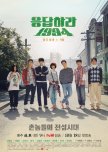
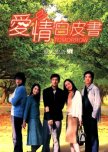

5 characters who are near the end of their college lives form a friendship. Realizing that life has issues and sometimes the support you need can come from this group is a common factor between the shows. Side characters get plot and development. There is also romance. Main characters are well acted as well.
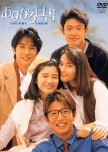

Zhou Shen Shen loses her voice after a bus accident and gets taken to the hospital by her friend, Zuo Jun, who blames himself for making her mute. There she meets Qi Wei Yi, a boy whose leg got broken by jealous peers. He finds a letter she had put in a bomb shelter wall. They leave each other letters and promise to come back in the Christmas of 2006. They become good friends and fall in love, but Wei Yi is unaware that Shen Shen is mute. When he has to leave before her, he gives her his phone number and tells her to call him.
Years pass and in the year of 2006 ,they met again but is unaware of who each other is until Wei Yi finds out he has liver cancer and is dying. So he decides to go back to the hospital he went to as a child and he finds out that Shen Shen is his childhood love but not wanting to hurt her when he dies, he hides his identity and eventually pushes her away
Years pass and in the year of 2006 ,they met again but is unaware of who each other is until Wei Yi finds out he has liver cancer and is dying. So he decides to go back to the hospital he went to as a child and he finds out that Shen Shen is his childhood love but not wanting to hurt her when he dies, he hides his identity and eventually pushes her away


